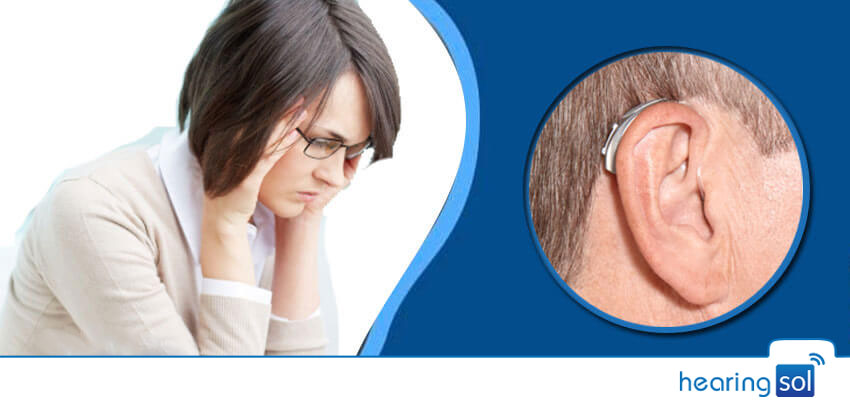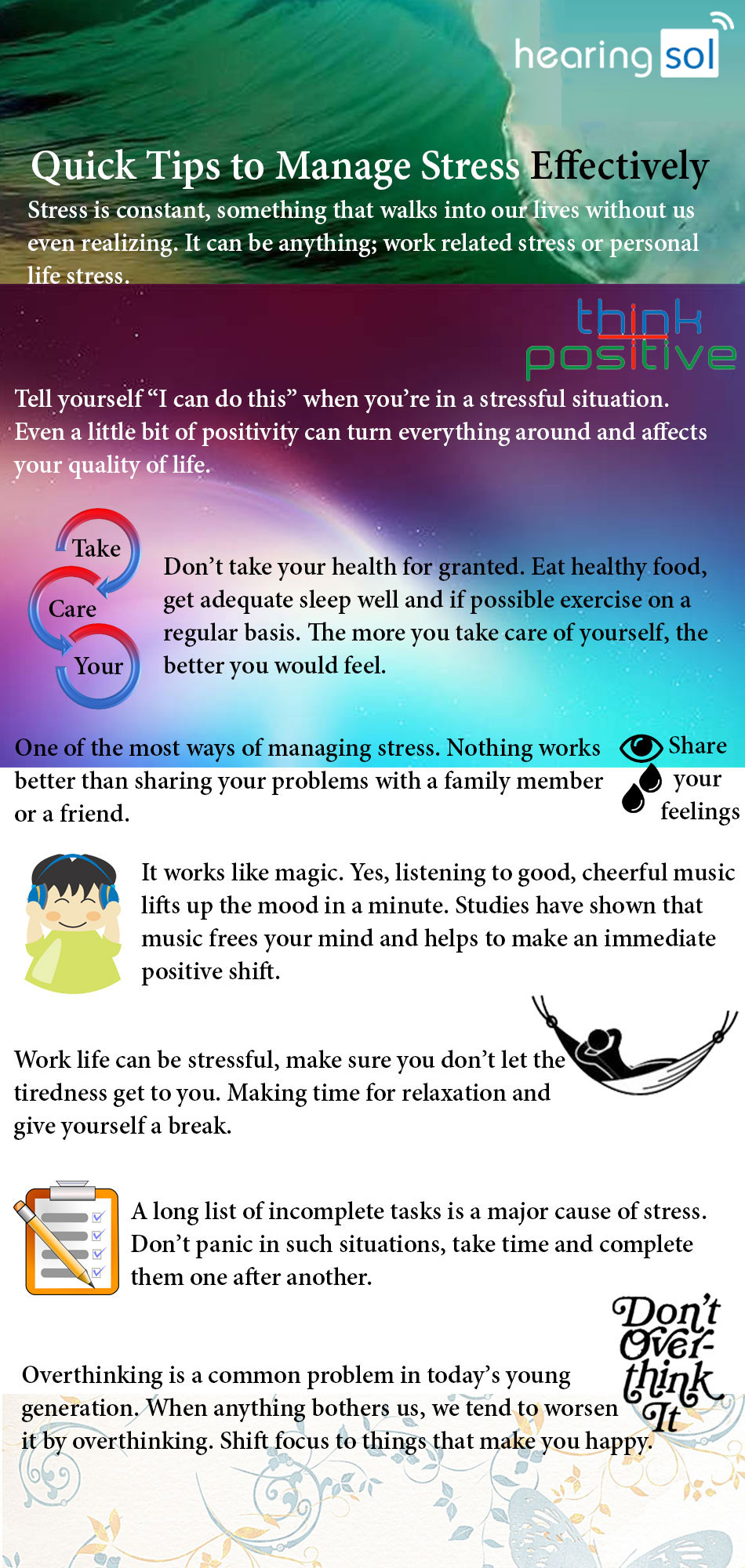
Hearing loss doesn’t just affect your hearing but it also affects your life and lifestyle as well. It can give you social anxiety and many more negative effects like depression.
You can purchase the latest hearing aids at a fair price through HearingSol, If you need any assistance or you have a query regarding Hearing Loss and Depression, feel free to call us at +91-9327901950. We are always here to help you.
In this article, we are going to discuss what is the connection between hearing loss and depression. We all know that diseases like hearing loss can cause depression to any sufferer but then the question arises “Is hearing loss caused by depression too”.
So without wasting any more time lets find out.
Can Hearing Loss Cause Depression?
Yes, hearing loss can cause depression. Generally, people with untreated hearing loss get some mental problems such as depression, anxiety, anger and frustration, emotional instability, and paranoia. They avoid organized social activities.
The level of depression and mental condition increased with the severity of hearing loss. According to the national council on the Aging (NCOA). The untreated hearing loss has major or serious emotional and social effects for older persons.
Suffering From Hearing Loss Lead To Depression
Hearing loss and depression both are serious emotional, social, and economic consequences for a person. Have you ever canceled any social meeting or party because you had anxiety about meeting in a noisy environment?
Have you felt embarrassed because you are unable to understand what other people speak? So this is the problem with the people who have hearing loss and also suffer from anxiety.
Research has shown a link between hearing loss and increased rates of depression. Restoring normal hearing levels may be part of the solution for many people with unaided or poorly treated hearing loss.
By analyzing data from the U.S. National Health and Nutrition Examination Survey, the possible links between depression and hearing loss including 18,000 adults aged 18 or above and nearly 15% of women across all ages felt depressed compared to 9% of men.
Various Reasons for Hearing Loss That Lead to Depression
- Communication and social interactions become a source of stress. When someone has to strain to hear others speak, frequent misunderstandings result in embarrassment.
- People with untreated hearing loss avoid social situations that involve loud surroundings around them. They avoid parties or crowded restaurants where understanding speech difficult.
- Older patients may feel their hearing loss is a signal that they are simply too old to participate in social activities.
- Cutting oneself off from society and activities is a red flag for depression.
Facts or Risk of Patients with Hearing Loss that Lead to Depression
- In a study conducted on Generation X and Baby Boomer patients with an untreated hearing loss. The participants of a study found to develop depression and other psychological issues than their hearing peers.
- Another large study of adults 50 and older with untreated hearing loss get depression and other emotional and mental instabilities and were significantly less socially active than their peers who wore hearing aids.
- The study show depression and other similar disorders were found to worsen as hearing ability declined.
- Patients with untreated hearing loss get difficulty to communicate with others, avoidance of social interaction with friends and family. Isolation is a known contributor to depression.
- Depression in older adults has been associated with the development of dementia or Alzheimer’s disease. Which is also a co-morbidity of hearing loss.
- Along with depression, patients with untreated hearing loss experience anxiety, paranoia, relationship problems, stress, and other negative emotions.
- Using hearing aids can significantly improve emotional and cognitive conditions in patients over the age of 65.9
- 36% of patients who begin wearing hearing aids experienced improved overall mental health, while 34% increased their social engagement.
- Despite the fact that hearing aids can help improve patients’ lives, the average span of time from a patient realization of Hearing loss to the purchase of hearing aids is eight years.
Can Depression Cause Hearing Loss?
Sadness, feeling down, having a loss of interest in daily activities – these are symptoms of depression. Untreated hearing loss may be linked to mental decline and can sometimes affect an individual’s daily life and lead to depression.
Depression is the leading cause of disability among adults affecting over 15 million, and hearing loss are second. The link between depression and hearing loss is easy because hearing loss impacts your daily life and this goes into depression.
Hearing loss people also experience emotions such as Social isolation, Awkwardness, Inadequacy, Embarrassment.
Depression and Hearing Loss can definitely be linked together, first not being the reason for later. But a hearing loss or progressive hearing loss can definitely be the reason for depression and even anxiety.
Any untreated hearing loss can adversely affect your daily life ultimately leading to Depression. According to Social Work Today, there are some negative emotions experienced by a hearing loss patient, such as:
- Awkwardness, if failed to understand what other person is saying.
- Inadequacy, while dealing with certain situations.
- Embarrassment, while you are at a public place.
- Social isolation, resulting in cut off from society.
However, the Hearing Solution has a different type of hearing aid for different people which helps improve your hearing, which may combat the effects of depression.
Communications Issues
The hearing and thinking both are connected and depression affects nearly one in six people at some point in their lives.
Hearing loss is essentially a communication disorder that has impact the individual people emotionally, physically, and mentally who are suffering from this condition. To improve care, we need to change the way we think about the condition.
Depression has wider effects on general health and activity levels which has a knock-on effect on the entire body. People with hearing loss and who do not wear hearing machine, find it more difficult to communicate with other people or in the crowd.
According to health specialists if you have a hearing loss problem you should concern with hearing professionals and take a hearing test as soon as possible.
Type of Anxiety That Affects Your life
Anxiety disorder is not at all easy to cure because it is self-sustaining. Many people experience depression symptoms that cause them more depression and affect their health.
There are many types of anxiety disorders exist:
- Agoraphobia is a type of anxiety disorder in which you avoid places to interact or fear to meet someone.
- Selective mutism is a type of disorder that exists in kids to speak in certain places lie in school, fear to speak with family members.
- Panic disorder involves a sudden feeling of anxiety and fear that reaches a peak in minutes. You may feel a breathing problem, pain in the chest, heart palpitations.
- Generalized anxiety disorder includes persistent and excessive anxiety and tense about activities or events.
- Specific phobia is a type of fear identified by major anxiety when you are exposed to a specific object or situation and a desire to avoid it.
- Separation anxiety disorder is a childhood disorder characterized by anxiety that’s excessive for the child’s developmental level.
Hearing Loss Leading to Social Anxiety
Social withdrawal and isolation are factors related to poor hearing and feelings of depression. Increasing evidence that the relationship between hearing loss and depressive symptoms is stronger in middle-aged populations.
Hearing loss can also lead to social anxiety and depression.
According to a survey, the number of anxiety disorders is higher because of the language boundary between the hearing population and the deaf. Many people with hearing loss since social isolation, whether they realize it or not.
Hearing Solution make life easy for hearing loss people so that they can re-engage in public without any hearing problem
How To Manage Stress Effectively
Stress may be a reality of life, however, being stressed does not heal your problems though it affects your health. So try to avoid stress and make a peaceful mind.
Being to a fault anxious isn’t simply a mental hazard; it is a physical one too, with damaging effects to the brain and therefore the remainder of the body.
The additional stressed we have a tendency to are, the additional vulnerable we have a tendency to are to colds, flu, and a number of chronic or dangerous illnesses—and the less open we have a tendency to are to the wonder and pleasure of life.

Take Hearing Loss Treatment
Are you experiencing the following situation with yourself then find whether or not to seek help for your Hearing Loss Treatment
- Feeling shy to meet people in a social gathering.
- Confused in personal and professional works
- Feeling insecure when alone or while taking care of others.
- The social environment gives you anxiety.
- Relationship problems
- You find yourself asking people to repeat themselves
- Problem hearing over the telephone
Today’s devices are designed to fit seamlessly into an individual’s life, no matter the degree of hearing loss. Hearing aid users say they are satisfied with the changes that have arisen in their lives especially due to their hearing instruments.
From now they feel comfortable everywhere without any embarrassment. The best part is the Hearing aid wearers, powerful improvements to individual life in every area like relationships with family, conditions at home, social life, work environment, and other factors all improved with the use of hearing aids.
Conclusion
Some studies of older adults who have been using a hearing aid shown a reduction in depression and improved quality of life.
It is not like that if someone has hearing loss, he will experience depression but it is worth consideration. The quality of life of individuals with hearing loss can be improved if depression is identified.

You can purchase the latest hearing aids at a fair price through HearingSol, If you need any assistance or you have a query regarding Hearing Loss and Depression, feel free to call us at +91-9327901950. We are always here to help you.
Read more:
How tinnitus and hearing loss are related?
The Books that Every Speech Therapist Must Read
Doctor suggestion about hearing aids when you sleep at night.

 Reviewed by Mr. Ranjeet Kumar
Sr. Audiologist, Speech Therapist & Cochlear Implant Specialist, BASLP on
Reviewed by Mr. Ranjeet Kumar
Sr. Audiologist, Speech Therapist & Cochlear Implant Specialist, BASLP on